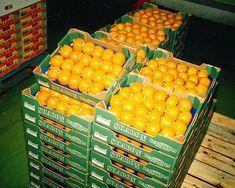
Sharonfruit sendings from Israel are world-wide, although Europe remains the main market with a 40 per cent share, some 30 per cent is sent to North America, 30 per cent to south-east Asia and the Far East and small quantities to Australia and South Africa.
According to the board, sharonfruit plantations cover an area of 1,500 hectares of fruit-bearing trees and 250ha of new plantations, located all along Israel’s coastal plain. It is estimated that within three years, plantations will cover 2,000ha.
Yields are about 35,000 tonnes annually of which 16,000t are exported, generating sales returns of $26 million. The success of the Israeli variety on foreign markets is due to its unique qualities, said Yair Kaplan, head of the sharonfruit desk at the board. He noted that Israeli growers cultivate Triumph, which typically achieves brix levels of 22-25°, compared with persimmon grown in other countries that has no more than 13-15° brix. “This means the Israeli variety is a fruit in constant demand,” said Kaplan adding that using advanced storage technologies, which prolong the shelf-life of the fruit, “is part of our export and marketing success.”
The Israeli season runs from October to February. Harvesting is carried out during October and November, but due to storage technologies, Israeli exporters can send the fruit to overseas markets until the end of February, at a time when there are no supplies from other countries.



